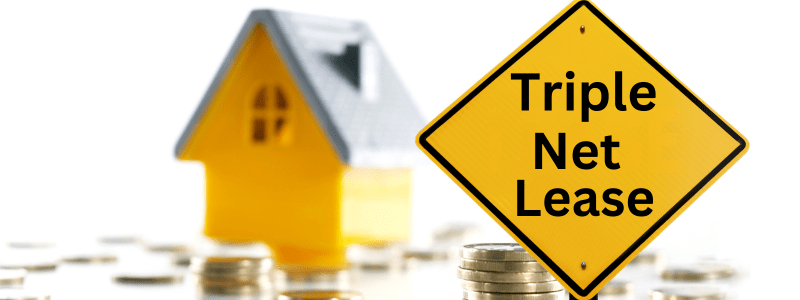
Are you dipping your toes into the real estate waters? If you’re keen on investing but want something a bit more hands-off, the Triple Net Lease (NNN) might just be your golden ticket. But what’s the deal with this NNN thing, anyway? And why should you care? Well, buckle up because we’re about to dive deep into the world of Triple Net Leases.
Understanding Triple Net Lease (NNN)
Definition of Triple Net Lease
First things first, let’s decode the jargon. A Triple Net Lease, often abbreviated as NNN, is a lease agreement where the tenant takes on the responsibility for the three major expenses associated with the property: property taxes, insurance, and maintenance costs. Basically, the tenant pays for almost everything except the mortgage.
How Does Triple Net Lease Work?
Here’s the deal: In a Triple Net Lease, you as the investor or landlord receive a steady stream of rental income while the tenant shoulders most of the financial and operational burdens. Think of it like owning a car but having someone else pay for the gas, insurance, and repairs. Sounds pretty sweet, right?
Components of a Triple Net Lease
Property Taxes
Under an NNN lease, the tenant covers the property taxes. This means you don’t have to worry about those pesky annual tax bills.
Insurance
Insurance costs are also transferred to the tenant. They will handle the insurance policies required to protect the property, which can be a significant relief for landlords.
Maintenance Costs
From fixing the roof to maintaining the HVAC system, the tenant is responsible for all maintenance and repair costs. This reduces your involvement in the day-to-day management of the property.
Benefits of Triple Net Lease for Investors
Steady Income Stream
With the tenant covering most expenses, your rental income remains steady and predictable. This can be a major advantage, especially in uncertain economic times.
Lower Management Responsibilities
Because the tenant is responsible for maintenance and other costs, your role as the landlord is significantly reduced. You can sit back, relax, and enjoy the passive income.
Long-Term Tenants
Triple Net Leases often attract long-term tenants, such as retail chains and corporations, looking for stable, long-term lease agreements. This stability can be a boon for your investment portfolio.
Risks and Drawbacks of Triple Net Lease
Financial Risks
Despite its benefits, an NNN lease isn’t risk-free. If the tenant defaults or the property value drops, you could face financial losses.
Market Risks
Market conditions can impact the value of your property and the ability to find or retain tenants. Always keep an eye on market trends and economic factors.
Tenant Default Risks
If the tenant fails to meet their financial obligations, you could be left covering the costs. It’s essential to vet potential tenants thoroughly.
Comparing Triple Net Lease with Other Lease Types
Single Net Lease
In a Single Net Lease, the tenant pays property taxes in addition to rent, while the landlord covers insurance and maintenance costs.
Double Net Lease
A Double Net Lease requires the tenant to pay both property taxes and insurance, but the landlord remains responsible for maintenance.
Gross Lease
With a Gross Lease, the landlord covers all property expenses, including taxes, insurance, and maintenance, which is the opposite of a Triple Net Lease.
Ideal Properties for Triple Net Lease
Commercial Properties
Office buildings, shopping centers, and other commercial properties are often leased under NNN agreements due to their long-term, stable nature.
Retail Spaces
Retail chains prefer Triple Net Leases for their predictability and control over property expenses.
Industrial Properties
Warehouses and distribution centers are also common candidates for NNN leases due to their typically long lease terms and stable tenant base.
Evaluating Tenants for Triple Net Lease
Creditworthiness
Always check a tenant’s credit history and financial stability. This reduces the risk of default and ensures they can meet their financial obligations.
Business Stability
Look for tenants with a stable business history and a solid track record. Established businesses are less likely to default on lease payments.
Lease Terms
Ensure the lease terms are favorable and clearly outline the responsibilities of both parties. A well-drafted lease can prevent future disputes.
Negotiating a Triple Net Lease
Key Negotiation Points
Focus on critical elements like rent amount, lease duration, and responsibilities for repairs and maintenance.
Lease Duration
Longer lease terms provide stability but ensure there are rent escalation clauses to keep up with inflation and market rates.
Rent Escalation Clauses
Include clauses that allow for periodic rent increases to protect against inflation and increase your income over time.
Legal Considerations in Triple Net Lease
Lease Agreement Clauses
Ensure the lease agreement is comprehensive, detailing all aspects of the lease, including responsibilities and dispute resolution mechanisms.
Compliance with Local Laws
Make sure the lease complies with local regulations and real estate laws to avoid legal issues down the line.
Dispute Resolution
Include clear dispute resolution processes in the lease to handle any disagreements that may arise between you and the tenant.
Financing a Triple Net Lease Investment
Loan Options
Various loan options are available for financing NNN properties, including traditional mortgages and commercial loans.
Interest Rates
Shop around for competitive interest rates to reduce your borrowing costs and maximize your investment returns.
Down Payment Requirements
Be prepared for significant down payment requirements, typically around 20-30% of the property’s value.
Managing a Triple Net Lease Property

Routine Inspections
Regular inspections ensure the tenant is maintaining the property according to the lease terms.
Tenant Relations
Maintain a good relationship with your tenant to facilitate smooth communication and timely resolution of any issues.
Maintenance Oversight
Even though the tenant handles maintenance, occasional oversight ensures they are fulfilling their obligations properly.
Case Studies of Successful Triple Net Lease Investments
Case Study 1
A retail chain leased a commercial property under an NNN lease, providing the investor with a steady income and minimal management duties.
Case Study 2
An industrial property leased to a logistics company resulted in a long-term, stable investment with predictable returns.
Case Study 3
An office building leased to a corporate tenant showcased the benefits of reduced landlord responsibilities and a reliable tenant.
Future Trends in Triple Net Lease Market
Technological Advancements
Emerging technologies in property management can streamline processes and improve tenant relations in NNN leases.
Market Dynamics
Understanding market dynamics, such as economic cycles and property trends, helps investors make informed decisions.
Economic Impact
Economic factors like interest rates and inflation can impact NNN lease investments, making it crucial to stay informed about market conditions.
Conclusion
So, there you have it—a comprehensive guide to Triple Net Leases. From the nitty-gritty of lease components to the benefits and risks, we’ve covered it all. Triple Net Leases offer a unique blend of steady income and reduced management responsibilities, making them a popular choice for savvy real estate investors. As with any investment, due diligence and careful planning are key. Ready to take the plunge into NNN leases? Happy investing!
FAQs
1. What is a Triple Net Lease?
A Triple Net Lease (NNN) is a lease agreement where the tenant pays property taxes, insurance, and maintenance costs in addition to rent.
2. What are the benefits of a Triple Net Lease for investors?
Benefits include a steady income stream, lower management responsibilities, and long-term tenants.
3. What risks are associated with Triple Net Leases?
Risks include financial losses if the tenant defaults, market risks, and tenant default risks.
4. How does a Triple Net Lease differ from other lease types?
Unlike single and double net leases, where the tenant covers one or two additional expenses, NNN leases have the tenant covering taxes, insurance, and maintenance.
5. What properties are ideal for Triple Net Leases?
Commercial, retail, and industrial properties are commonly leased under NNN agreements.
For more insights into effective budgeting and its importance in financial planning, explore our detailed guide on WHAT IS BUDGETING AND WHY IS IT IMPORTANT?
